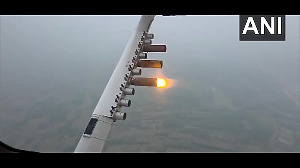Leaders of the world's eight wealthiest nations have categorically denounced terrorist attacks worldwide and strongly condemned the perpetrators of these atrocities.
Without mentioning the recent blasts in Mumbai's commuter trains that killed 200 people, the leaders of Russia, the US, Britain, Canada, France, Germany, Italy and Japan have expressed "deepest sympathy" to all victims of these attacks.
"We, the leaders of the G-8, meeting in St Petersburg, categorically denounce terrorist attacks worldwide and condemn in the strongest terms those who perpetrate these atrocities and bring untold suffering and death to citizens," the G-8 counter-terrorism statement said.
"If terrorism and violent extremism are permitted to exist anywhere, they diminish our societies everywhere. Today we pledge that we will not rest until the terrible blight of terrorism has been removed from our daily lives."
Noting that the global terrorist threat requires a global response, the G-8 sought coordinated action by its members and its international partners to reduce the likelihood of attacks and to address their terrible consequences.
Recognising the centrality of the United Nations' role in achieving universal agreement on the condemnation of terrorism, the G-8 emphasised the urgency of enhancing cooperation to counter terrorist and other criminal attacks on critical energy infrastructure facilities.
A plan of action to secure critical global energy infrastructure, including defining and ranking vulnerabilities of key infrastructure sites, assessing emerging and potential risks of terrorist attacks, and developing best practices for effective security across all energy sectors within G-8 countries has also been finalised at the summit under Russia's rotating presidency.
Among the other steps announced by G-8 are implementing and improving the international legal framework on counter-terrorism, ensuring national legislation is adapted to address new terrorist challenges, suppressing attempts by terrorists to gain access to weapons and other means of mass destruction, and engaging in active dialogue with civil society to help prevent terrorism. The countries also will enhance efforts to counter the financing of terrorism based on agreed standards, and develop and implement an effective strategy to counter terrorist propaganda and recruitment, including the use of suicide bombers while effectively countering attempts to misuse cyberspace for terrorist purposes, including incitement to commit terrorist acts and to communicate and plan terrorist acts.
They also vowed to prevent any abuse of the migration regime for terrorist purposes while at the same time facilitating legitimate travel. They called for bringing to justice, in accordance with obligations under international law, those guilty of terrorist acts as well as their sponsors, supporters, those who plan such acts and those who incite terrorist acts.





